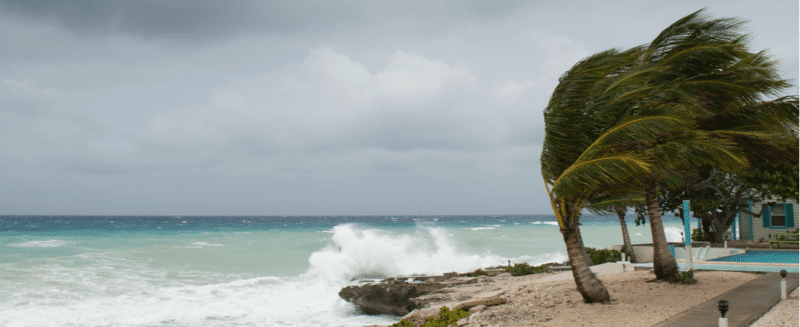Peak hurricane season 2019: are you prepared? As Hurricane Dorian and Tropical Storm Fernand bare down Gabrielle strengthens over the Atlantic.
Peak Hurricane Season 2019: Are You Prepared?
Most hurricane seasons to date have had six hurricanes, but this year the National Oceanic and Atmospheric Administration (NOAA) forecasts five to nine hurricanes in the Atlantic before the end of November.
Hurricane Dorian and Tropical Storm Fernand are wreaking havoc as they make landfall this week. Tropical Storm Gabrielle is strengthening and could become the next hurricane in the Atlantic Basin.
Homeowners aren’t convinced that hurricane season is heating up. Nearly half of the homeowners in hurricane-prone states responding to a recent survey by ValuePenguin haven’t begun preparations and predict the U.S. will experience no more than three hurricanes in 2019.
Despite ongoing media attention on the dangers of climate change, flooding and hurricanes, homeowners vastly underestimated the potential cost of hurricane and flood damage and were unclear about insurance coverage, which is concerning as we head into the thick of this year’s hurricane season.
How Much Will It Cost to Repair Damage in 2019 After a Hurricane?
A lot. More than half of homeowners in hurricane-prone states estimate the cost to repair the average home after a hurricane or flood to be less than $10,000. And yet, the National Flood Insurance Program reported an average of $91,735 for hurricane-related claims in 2017. FEMA reported the average claim payment from Hurricane Michael (October, 2018) was $57,754 and from Hurricane Florence, in September of 2018, it was $47,138.
According to the Office for Coastal Management, the five most expensive hurricanes (in terms of total damages includes Katrina (2005, $161 billion), Harvey (2017, $125 billion), Maria (2017, $90 billion), Sandy (2012, $71 billion) and Irma (2017, $%0 billion).
The top five most expensive U.S. coastal areas with properties vulnerable to hurricanes, includes New York (with insured property worth $2.92 trillion), followed by Florida ($2.86 trillion), Texas ($1.17 trillion), Massachusetts ($849 billion), and New Jersey ($713 billion).
Clearly, repairing damage from a hurricane is getting more expensive, although it varies based on how intense the hurricane storm develops, and how much flooding ensues.
Why are homeowners underestimating the frequency of hurricanes and the costs of hurricane-related damages? ValuePenguin found that nearly 4 in 10 homeowners said they believed that weather professionals “exaggerate the risk level of incoming hurricanes.” Almost 60 percent of homeowners would only evacuate their homes if it was mandatory and about 10 percent said they would not evacuate at all.
According to the ValuePenguin report, “This and other survey responses suggest that a significant number of homeowners underestimate the likelihood of being personally affected by a hurricane.”
Does Your Homeowners Insurance Cover Hurricane-Related Damage?
In high-risk states, nearly half of homeowners said they didn’t know how much hurricane-related insurance they would need to be fully protected. This confusion could stem from uncertainty about what flooding events are covered by a standard homeowners insurance policy.
Typically, homeowners insurance covers damage caused by flooding inside the home if a pipe bursts. It usually does not cover flooding caused by a “rising tide” of water. If your house is in the path of a hurricane, and the wind causes a tree to fall on your roof, and rain then falls into your home and causes damage, your regular homeowners insurance policy might cover that. If, however, the water from the hurricane causes a river to overflow its banks and flood your home, that likely won’t be covered.
Homeowners who live in areas where hurricane risk is the highest (including the eastern shore of the U.S. and the Gulf Coast) should dig into the details of their insurance policies to make sure they’re fully covered if (and how) their homes are damaged in a hurricane. It’s understandable to be skeptical of weather professionals (aren’t we all?) but the history of hurricane frequency and damage is well documented, as is the rising cost of repairing that damage. In this case, it’s better to be safe and protected than caught off-guard.
More on Hurricane Season and Natural Disasters
Natural Disaster: What to Do Before You Make Home Repairs
Homeowner’s Insurance vs. Natural Disaster Insurance
Natural Disaster Insurance Claims: What To Do
Home Repairs: Do It Yourself or Hire Help?
3 Remodel Ideas for Your Next Home Renovation
Home Improvement: What’s Most Valuable for Resale?
Best Options for Financing Home Improvement Projects
Seven Ways to Save on Your Remodeling Project







Leave A Comment